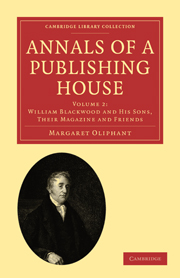Book contents
- Frontmatter
- Contents
- CHAPTER XII PUBLICATIONS
- CHAPTER XIII NEW CONTRIBUTORS
- CHAPTER XIV DOMESTIC LIFE
- CHAPTER XV DOMESTIC AND PUBLIC LIFE
- CHAPTER XVI ILLNESS AND DEATH
- CHAPTER XVII THE BROTHERS
- CHAPTER XVIII MORE LIGHTS OF ‘MAGA’
- CHAPTER XIX THE METROPOLITAN BRANCH
- CHAPTER XX THE RANK AND FILE
- CHAPTER XXI LONDON AND EDINBURGH
- CHAPTER XXII 37 PATERNOSTER ROW
- CHAPTER XXIII THE NEW BLACKWOOD BAND
- CHAPTER XXIV MAJOR BLACKWOOD
- INDEX
- Plate section
CHAPTER XV - DOMESTIC AND PUBLIC LIFE
Published online by Cambridge University Press: 11 April 2011
- Frontmatter
- Contents
- CHAPTER XII PUBLICATIONS
- CHAPTER XIII NEW CONTRIBUTORS
- CHAPTER XIV DOMESTIC LIFE
- CHAPTER XV DOMESTIC AND PUBLIC LIFE
- CHAPTER XVI ILLNESS AND DEATH
- CHAPTER XVII THE BROTHERS
- CHAPTER XVIII MORE LIGHTS OF ‘MAGA’
- CHAPTER XIX THE METROPOLITAN BRANCH
- CHAPTER XX THE RANK AND FILE
- CHAPTER XXI LONDON AND EDINBURGH
- CHAPTER XXII 37 PATERNOSTER ROW
- CHAPTER XXIII THE NEW BLACKWOOD BAND
- CHAPTER XXIV MAJOR BLACKWOOD
- INDEX
- Plate section
Summary
The family by this time had come to the eve of those changes which are involved in the growth and development of sons and daughters. The young men, both of independent mind and character, though owning the authority and influence of the head of the house with a natural duty and subordination always beautiful to see, were taking more and more part in the management of the business, and preparing unconsciously to assume, as was so soon to be necessary, the entire management of affairs. Mr Blackwood himself was now (1830) a fresh and lively man of fifty-four; according to the evidence of his portrait, looking older than his age, but still ruddy and hearty, with strength unimpaired and vigour unbroken, notwithstanding all his labours and anxieties. His business was flourishing, his beloved ‘Maga’ triumphant, with a circulation and a reputation unequalled, and there was now no longer any prudential reason to restrain expenditure or to be content with the humble housing of early days. The first step towards larger living and extended business was the acquisition of new premises in George Street—the familiar “45,” which has now for more than half a century been the symbol of the Blackwood headquarters to all the immediate supporters of the Magazine. George Street was then the pride of Edinburgh, which every new inhabitant agreed in desiring to make one of the most imposing and architecturally correct of streets—sweeping in a broad and ample line from the dome of St George's, admired by everybody, to the width and greenness of St Andrew Square at the other end.
- Type
- Chapter
- Information
- Annals of a Publishing House , pp. 96 - 116Publisher: Cambridge University PressPrint publication year: 2010First published in: 1897



